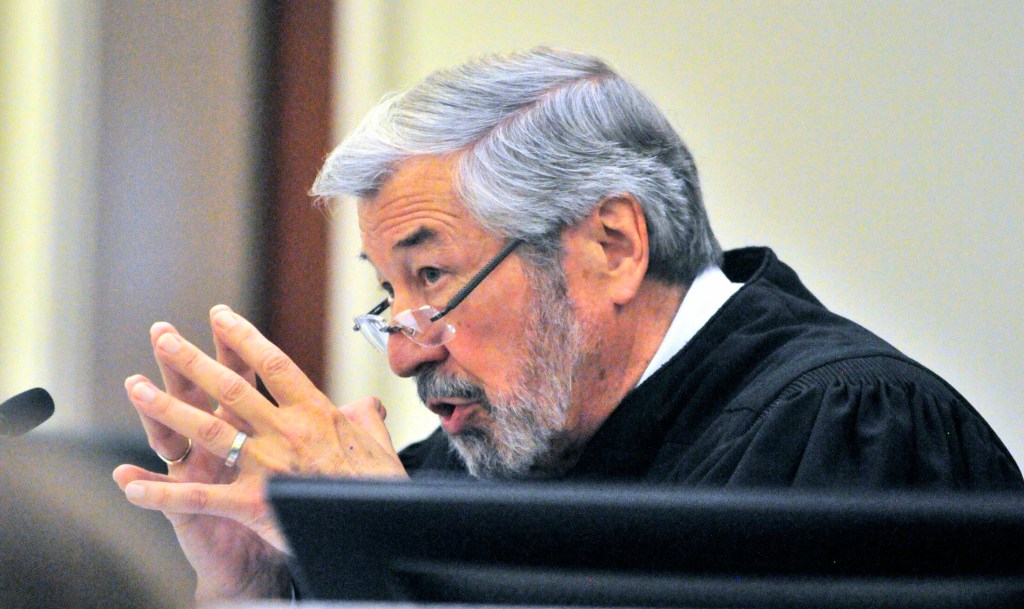LEWISTON — A Maine judicial panel admonished the district attorney for Kennebec and Somerset counties Monday because of a June 2014 meeting she had with a judge at his request.
Maeghan Maloney was accused of misconduct for meeting with Superior Court Justice Donald Marden about a child sex assault case without an attorney for the defendant present. Because of the meeting, the conviction of Eric Bard of Sidney on multiple charges was overturned and a new trial was ordered.
Marden directed Maloney to meet with him and answer questions, a Maine Board of Overseers of the Bar panel noted in its findings. Whether Marden is also facing disciplinary action is unclear. Unlike complaints against attorneys, complaints against judges in Maine are handled confidentially, unless disciplinary action is taken by the Maine Supreme Judicial Court.
Maloney said at the time it was her understanding that she was required to respond to the judge’s request. She said she now recognizes that she could – and should – have said no.
“I now understand I should not have responded to his request, and I should not have answered his questions,” Maloney said after a roughly 45-minute disciplinary hearing before the three-person grievance panel of the Maine Board of Overseers of the Bar, which governs the conduct of attorneys. “I think it’s an important message that, when you find yourself in a position like that with someone that has power over you, to stand up for yourself.”
Admonishment is the lowest level of sanction the board can issue. Admonition, according to Maine Bar Rules, is a non-disciplinary sanction to be imposed “only in cases of minor misconduct, when there is little or no injury to a client, the public, the legal system, or the profession, and when there is little likelihood of repetition by the lawyer.”
“DA Maloney did engage in an improper discussion with the trial court, but she believed she was required to respond to the court’s directive to appear for that meeting,” members of the panel wrote in their decision. “The Commission also finds that while DA Maloney did communicate information relevant to a determination of Bard’s competency, she subjectively believed that she was required to provide this information to ensure that she was completely and fully responding to the trial judge’s questions.”
Jacqueline M. Rogers, executive director of the overseers, said it is rare for the board to take disciplinary action against a state prosecutor, but not unheard of.
In July 2013, Mary N. Kellett, then an assistant district attorney in Hancock County, was found by the overseers to have violated rules of conduct, including withholding evidence, while prosecuting a former Gouldsboro man in 2008 and 2009. It was the first such complaint in Maine against a prosecutor, according to news reports at the time.
Being asked questions by a judge without defense counsel present is a rare circumstance not many attorneys encounter, overseers’ attorney Aria Eee said at Monday’s session at Lewiston District Court.
Bard was sentenced to 50 years in prison in 2015 for allegedly sexually assaulting a 4-year-old girl he was babysitting on multiple occasions. But last year, the state supreme court, ruling on an appeal, vacated his conviction and deemed he deserved a new trial because his due process rights were violated when the judge and Maloney discussed his case without Bard’s attorney present.
Marden could not be reached for comment Monday. Earlier this month, when the complaint against Maloney first came to light, he would not say whether he was facing disciplinary action related to the Bard case.
If he is, it would likely be before the Maine Judicial Responsibility and Disability Committee, which investigates misconduct complaints against judges. Unlike the board of overseers process, which was open to the public, the judicial committee’s process is confidential unless it charges the judge in the supreme court, according to Cabanne Howard, the committee’s executive secretary.
Howard said Monday he would not confirm or deny whether action is being taken against Marden.
Attorney Thomas Kelley, a member of the grievance commission panel, asked Eee why Maloney’s conduct only warranted admonishment rather than a more severe action such as a reprimand.
“How is the impact of this conduct minor?” Kelley asked. “It seems like it had a substantial impact on the legal proceeding. I understand the judge was the one who facilitated the ex parte conference and probably went overboard, but it seems to me the DA had some responsibility when realizing perhaps this conference was getting out of hand,” and should have insisted the defense attorney be present.
Eee responded that it was clear that Marden had “expected DA Maloney to be there and to answer his questions. From bar counsel’s point of view, most of the concern about what happened really is attributable to the court. Yes, the DA participated in the conference, but she’s not the one who initiated the conference.”
Eee said Maloney took responsibility for the fact that the conversation with Marden, which included at least some discussion of Bard’s mental competency, went too far. Bard’s mental competency was a matter of contention in the trial.
Maloney said when she was called to Marden’s chambers there was a court reporter and court clerk present so she thought it was an official proceeding. A transcript of the meeting was kept but it was ordered sealed by Marden.
Maloney said the purpose of the conference with Marden was to discuss the defense’s accusation that Maloney had violated a gag order by talking about the case to the press, a claim that was determined to be unfounded, she said.
On Aug. 8, 2014, during jury selection for the Bard trial, a defense attorney said he understood Marden had engaged in ex parte communications with Maloney regarding the case. Marden told the defense attorney that his communications with Maloney were not relevant to the case, and thus the attorney did not request a transcript of the June 23, 2014 conversation, according to the overseers’ findings.
Maloney, who was not a prosecutor in the Bard trial, was not present for jury selection and thus could not address whether her conversation with Marden dealt with the facts of the case.
Assistant Attorney General Christopher Taub, who defended Maloney on Monday, said it would be the court’s responsibility to provide a transcript of the meeting between Maloney and the judge if one was needed.
A defense attorney later obtained the transcript and appealed the case to the state supreme court. The court vacated all action taken after the June 23, 2014 conference, essentially tossing out Bard’s conviction.
Bard’s retrial has not yet been scheduled, according to a court clerk.
Darrick Banda, one of Bard’s defense attorneys, said he could not comment about the Bard case because the court has issued a gag order.
Bard’s 2014 trial ended when he entered conditional guilty pleas to 11 charges of sexual exploitation of a minor, seven charges of gross sexual assault on a child under 12, two charges of unlawful sexual contact and one charge of assault. The offenses allegedly occurred from December 2011 to April 2012 while Bard was babysitting the daughter of a friend in Augusta.
Comments are not available on this story.
Send questions/comments to the editors.




